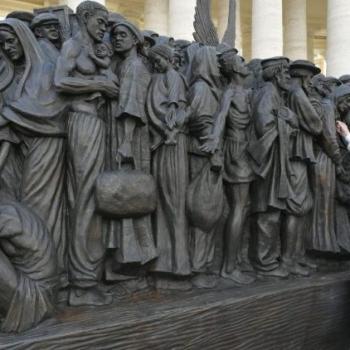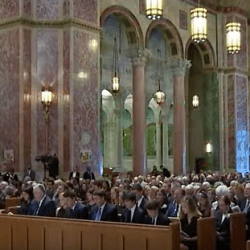One passage in the final document of the recently-completed Synod of Bishops is raising eyebrows:
Is this a bad idea? Is it (as one site claims) “Soviet-style censorship”?
Well, in theory, it doesn’t sound all that different from the time-honored practice of issuing a “Nihil Obstat” or “Imprimatur” on a published work:
The Nihil Obstat (nothing stands in the way) and the Imprimatur (it may be printed) are indications that a written work is not known to be in contradiction to the Faith. As printed in many works which bear these indications, we read:
“The Nihil Obstat and Imprimatur are a declaration that a book or pamphlet is considered to be free from doctrinal or moral error. It is not implied that those who have granted the Nihil Obstat and Imprimatur agree with the contents, opinions or statements expressed.”
Some additional background:
Regarding Nihil Obstat and Imprimatur: In brief, a Nihil Obstat is a declaration from a theologian called the Censor Librorum that a book is free from doctrinal or moral error – it literally means “Nothing Hinders.” If the bishop’s Censor Librorum grants the Nihil Obstat, then the Bishop, in his name and by his episcopal powers, confers the Imprimatur, which means “let it be printed.” The Imprimatur is the result of the Nihil Obstat -i.e., “Nothing hinders”, therefore, “let it be printed.” Both can be taken as guarantees that the book is free from moral or doctrinal error, but because the Imprimatur comes directly from the Bishop and is the final step in the printing process, it is commonly considered to be more authoritative, though I’m not sure whether or not this is true.
Many works will include this statement:
“The Nihil Obstat and Imprimatur are official declarations that a book or pamphlet is free of doctrinal or moral error. No implication is contained therein that those who have granted the Nihil Obstat and the Imprimatur agree with the content, opinions or statements expressed.”
Notice the statement says only that it is free from doctrinal or moral error – this means that what is contained in the book may still be completely false; however, as long as it doesn’t contradict faith or morals, the Imprimatur can still be granted. For example, a book on Church history might errantly and ignorantly report the commonly stated canard that 9 million people were killed in the Inquisition. This is a completely false statement, but it does not conflict with faith or morals (just common sense) and so the book could still get the Imprimatur.
Furthermore, we should understand that since these declarations come from the Diocesan Bishop, they can ultimately only be as good and reliable as the Bishop who grants them. This is the key principle to keep in mind with these declarations. They are not authoritative statements of the Magisterium, nor are they in the least bit protected by the charism of infallibility. They are the opinions of a private theologian (the Censor Librorum) and the official declaration of the Bishop, who in most cases is simply going along with what the Censor Librorum says.
If a Bishop is a solid theologian or good repute and orthodox disposition, then you have every reason to implicitly trust the Imprimatur – however, even that does not mean that what you find in the book is not errant, especially in your example (historical facts relating to archaeology). An Imprimatur issued by a very unorthodox Bishop would be suspect by that fact alone – remember, as stated above, these declarations are extensions of the Bishop’s own ideas of what is acceptable and what is not. They are only as reliable as the Bishops who issue them and possess no inherent protection from error.
It remains to be seen if this is what the Vatican is actually proposing for Catholic websites or blogs — or what criterion would be used to evaluate them (and who would do the evaluating.) And, really: a blog or website is a different creature from a book; it is a living thing, whose content might change every day, if not every hour. What appears “free of doctrinal or moral error” on Monday might be a cesspool of bungled theology and inaccuracies on Tuesday. And if you wade into the comments section, forget it; certifying that comments and outside opinions are always free of error is fundamentally impossible.
So how would you “certify” fidelity? And whose idea of “fidelity” are you certifying?
Can you even do it online?
Stay tuned.
UPDATE: Some thoughtful readers have suggested that what the Vatican has in mind might be closer to the “Letter of Good Standing” that clergy and some lay people are required to present when teaching or speaking outside their home dioceses. (I routinely have to get a new letter whenever I travel, to verify my standing as a member of clergy and vouch for my credibility.) Others have wondered if some sites might seek to get a “mandatum,” as is required of some Catholic colleges.
Mike Lewis’s site Where Peter Is observes:
Naturally, anti-Francis bloggers and news outlets are up in arms about this proposition. One site described it as “Soviet-style censorship.” Another traditionalist site suggested,
“You can just imagine that a man in the shape of Uncle Ted McCarrick could be in charge of this “Vatican Digital Commission” that would promote the “Vatican Certification” of acceptable websites: those promoting sodomy would be accepted, while those promoting the Baltimore Catechism would be rejected…”
What we see here is the reactionary imaginations of the characters behind these sites running wild. Naturally, Michael Voris saw his website “Church Militant” as one of those targeted by this “censorship”:
“Since Church Militant specifically has already been unfavorably singled out by a semi-official publication of the Vatican, La Civiltà Cattolica, in June of 2017, Church Militant is presumed to be one of the internet sites accused of fake news and thereby targeted.”
While I would be thrilled to see an official Church denunciation of Church Militant, LifeSiteNews, The Remnant, and other dissident sites that pose as orthodox Catholic news outlets, I doubt that’s really what’s being proposed here.
It strikes me as quite unfeasible for the institutional Church to certify ANY lay-led apostolates (or even clergy-led ones, like Word on Fire) — let alone independent news sites, personal blogs, or that sort of thing. Not that those sites are bad, some are very good (like this one, for instance), but it’s unreasonable to expect active oversight for every personal website from the institutional Church, even if an outlet was open to such oversight.
It would be nearly impossible to create universal standards for policing content on independent sites and very risky for the Church to preemptively approve a site whose owner could theoretically go rogue at any point.
At this point, the Vatican proposal is vague. Any conjecture about what it would look like in reality or in practice is speculative. (But it’s interesting to speculate nonetheless…) Will anything come of it? I’m skeptical (for all the reasons noted above.)
But I should also add that when I speak about Catholic communications to various groups — whether lay people, priests or deacons — a recurring question is: “How can I tell if a ‘Catholic’ site is trustworthy? What places are good resources that present the faith accurately and the news fairly?” An objective barometer to help answer that question might be worthwhile.














